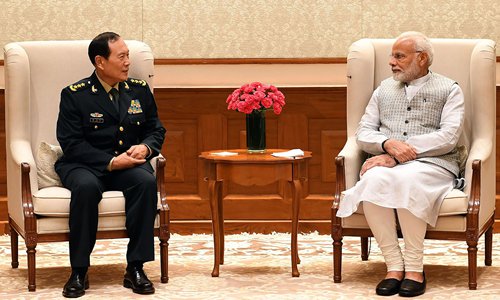
Indian Prime Minister Narendra Modi (right) meeting with China's Defense Minister Wei Fenghe in New Delhi, India on August 1 2018. (Photo: VCG)
China and India are working together on a program to train Afghani diplomats, a move Chinese experts said on Tuesday that could have the corollary effect of enhancing diplomatic ties and mutual trust between the world's most populous nations.
Chinese experts said the joint diplomatic training program could solve an important sticking point between China and India by easing concerns over China's diplomatic efforts to boosts ties with India's neighbors.
They also stressed that sustaining the newfound mutual trust will require India to actively cooperate with China as the program is extended to other countries in South Asia, and those along the route of the China-proposed Belt and Road initiative.
Chinese Ambassador to India Luo Zhaohui said the program could also be offered to more countries "such as, Nepal, Bhutan, Maldives, Iran and Myanmar."
Luo made the remarks at the inauguration ceremony of the China-India Joint Training Program for Afghan Diplomats in New Delhi on Monday.
Luo read a message from Chinese State Councilor and Foreign Minister Wang Yi at the ceremony, said the Chinese Embassy to India's website.
Wang said in the letter that the leaders of two countries have "reached important understandings on 'China-India Plus' cooperation. They have identified Afghanistan as a priority partner and agreed to start by jointly training Afghani diplomats."
Hu Zhiyong, a research fellow at the Institute of International Relations of the Shanghai Academy of Social Sciences, told the Global Times on Tuesday that "China-India Plus" involves the cooperation of China, India and a third party that work together to solve shared concerns and reach common goals.
As the US intends to reduce its input in Afghanistan, China-India-Afghanistan cooperation could be a much-needed supplement and even fill a void, Hu said.
"The US has a military presence in Afghanistan, and Pakistan has significant influence and interests in Afghanistan as well, but these two countries won't oppose China-India-Afghanistan cooperation because sustainable peace and stability in Afghanistan requires joint efforts from the entire international community," Hu noted.
Program to expand
While joint China-India cooperation in Afghanistan has been readily accepted, the key will be if India continues to participate with China and extend the program to other countries in the region, and those along the Belt and Road route, Lin Minwang, a professor at Fudan University's Center for South Asian Studies, told the Global Times on Tuesday.
"In the past, when China boosted ties with India's neighbors, New Delhi got worried and concerned about China's expanding influence in the region. Afghanistan is not India's neighbor, and this could be a start for China and India to effectively reduce mutual suspicion," Hu said.
"If the trilateral cooperation is successful, the model could be extended to other countries," Hu noted.
"We hope India will be more positive, open and cooperative on China's projects in other countries, not only in Afghanistan but also those near India and along the Belt and Road route. If that happens then the mutual trust between the two countries will also expand," Lin said.


